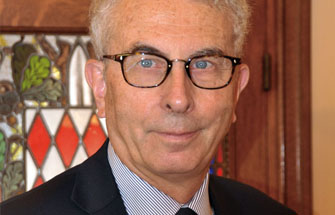Jacques Dorémieux has been Public Prosecutor of Monaco since October 2015. After working in hospital management for seven years, he chose the judicial authorities once and for all. A sitting judge for ten years, then a Public Prosecutor’s department magistrate for almost twenty years, he has extensive experience of all types of crime connected with financial flows.
Monaco’s brand image is high level security. Maintaining it is your number one challenge. Is white-collar crime your number two challenge?
Along with insurance, the financial sector is one of the main contributors to Monaco’s gross domestic product.
Two thirds of the assets managed by financial institutions, banks and management firms are made up of foreign funds; two thirds of the accounts belong to non-residents. So Monaco is necessarily involved in international finance, and this is a factor that can intensify financial crime. The vast majority of it is imported, resulting from crimes committed abroad. We mainly deal with cashless laundering of fraudulent financial flows. And marginally with some illegal taking of interest issues. As for self-laundering, that does not exist in Monaco.
How are you alerted?
By requests from the foreign authorities. Furthermore, Monaco financial centre professionals, bankers, management companies and the Service d’Information et de Contrôle sur les Circuits Financiers/Financial Circuits Information and Control Department (SICCFIN) all report events that may constitute criminal offences.
How can this type of crime be prevented?
By attempting to gain the collaboration of the foreign state concerned; collaboration levels vary by country, stakes and time. The connection between the offence in the country of origin and Monegasque accounts is established.
We benefit from legislative and regulatory machinery - we use the laws, of course, and we benefit from the work of those institutions that monitor the financial circuits (the SICCFIN, the Public Prosecution etc.). Plus two legal instruments: international agreements and national regulations.
Monaco is a micro-state, we cannot deploy our large neighbouring countries’ means.
Is Monaco well protected nevertheless?
Monaco is highly regulated, well monitored at the Commission de Contrôle des Activités Financières (Control Commission of Financial Activities) level, the means are significant given the size of the Principality, and above all the Sovereign Prince’s will is well-known for combating this form of crime. Remember that the Department of Judicial Services is answerable to the Prince. We set the major plans and perspectives together.
I want to develop partnerships with the business and financial world, with an information and training goal, and to conduct a prevention strategy: we need to prioritise certain forms of financial crime.
Is that the reason for your first meeting with the Monegasque Association of Financial Activities?
Absolutely, to partner with the banks, management companies, and all AMAF members in other capacities.
I want to allude to the stakes of financial crime, in the world of what I call "information fog". We are facing new methods of information processing: data theft, or capture, is made over to the public domain ; all of us can now access it and form an opinion. So there is a gap between the mass of information that public opinion accesses and what we (the financial authorities and the Public Prosecution) can do. This positioning is very difficult.
I will also mention New Information and Communication Technology: this is sometimes the very instrument of new forms of crime – including as regards deposit money flows.






